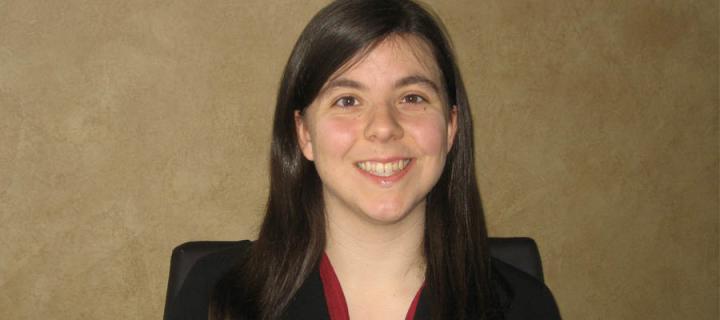Championing Gaelic
Bria Mason graduated from Edinburgh in 2009 with an MA in Celtic. She now works at the University as Gaelic and External Affairs Officer, and tells us about her education and current role.

Hailing from Wisconsin in the United States, Bria initially came to Edinburgh to study Classics and Linguistics. But after taking an option to also study Gaelic in her first year, she became fascinated by the language and decided to change her degree to Celtic in order to study it full-time.
After earning my degree, I was motivated to learn about minority languages in a global context. This led me to undertake an MLitt Language Policy and Planning at the University of Aberdeen, and undertake a graduate placement at Highlands and Islands Enterprise. I was working on the second iteration of the organisation’s Gaelic Language Plan, allowing me to live in Stornoway and get practical experience of what I had been studying.
Opportunities
Bria started working at the University of Edinburgh in 2013 when a Gaelic Officer post was created to support the University's new Gaelic Language Plan.
It was both challenging and exciting to come to a brand new role and to help shape it. In addition to supporting the Plan, I also ensure there are opportunities for students and staff who have Gaelic to use it, and for those who would like to learn Gaelic or to learn more about it to do so.
Community
The University also offers Gaelic taster courses for students and staff, and Bria runs language and culture sessions for those who want to learn more about Gaelic and its history. A particular highlight for her was a Gaelic-medium debate she organised in the run-up to the 2014 Scottish independence referendum - the only one of its kind to be held.
Bria enjoys working the the wider community, too:
As Gaelic speakers are a minority at the University and in the city, it is important to establish strong links with other organisations and community members. We are currently in production of a 'Gaelic in Edinburgh' leaflet that we have produced in cooperation with Edinburgh’s Gaelic community, with support from Bòrd na Gàidhlig. The aim of the leaflet is to raise awareness of Gaelic’s rich history in the city as well as to highlight where Gaelic can be learned and used in the city today.
Festival and students
She also heads up the Edinburgh Gaelic Festival, which began as a University-only programme of five events but which is now a city-wide festival and about to enter its fifth season.
Student engagement is also an important aspect of Bria's role:
I feel privileged to work with students. I am continually impressed by the dedication some of them show in championing Gaelic, and the support for Gaelic amongst students can be seen in a motion recently passed by EUSA in support of the language.
Bria has pride in her place of work, too:
Many people don’t realise that Gaelic has been spoken in Edinburgh for hundreds of years. In fact, the University of Edinburgh was the first to establish a Chair of Celtic in Scotland.

